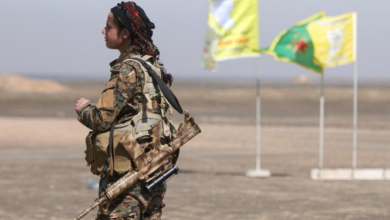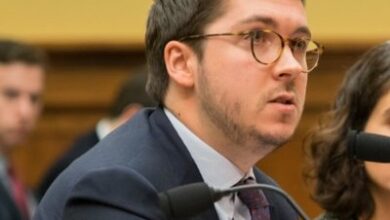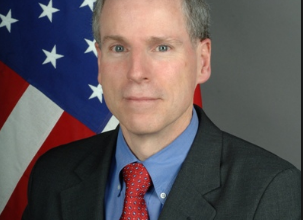
In the run-up to a deal, Iran does as it pleases
The West’s prominent argument claiming that the Islamic Republic will moderate its foreign policy and be a part of the civilized international and regional community has continued to fail.
In the wake of a final nuclear deal, nevertheless, the West has turned a blind eye on the actualities of the region.
Based on the latest developments, Iranian leaders and Islamic Revolutionary Guard Corps do not seem to have changed their attitude of hostage-taking and ratcheting up their influence.
Recently Iranian leaders have broken another “redline” set by President Obama, which was articulated in a letter in 2012, with regards to the Strait of Hormuz.
Being emboldened by the prospect of a final nuclear deal, Iran is asserting itself more forcefully in the Strait of Hormuz
Majid Rafizadeh
Being emboldened by the prospect of a final nuclear deal, Iran is asserting itself more forcefully in the Strait of Hormuz, which is a crucial strategic point in the world of international trade, fuels the global economy and is a gateway for the Gulf to the rest of the world.
Iran’s increasing influence is strategically and economically worrisome as the strait connects significant ports of key oil-exporting nations in the Gulf and according to the U.S. Energy Information Administration, the Strait of Hormuz is “the world’s most important oil transit chokepoint.”
IRGC and disregard for the international maritime law
Ignoring the basic legal agreements of international maritime law, Iran arrested the Maersk ship by ordering it to sail into Iranian waters and Shahid Bahonar Port, 24 members of the crew were detained. Nevertheless, Iranian leaders justify the arrest because it complies with laws of the Islamic Republic. What about the international regulations?
“Iran has total control over the strategic waterway… Closing the Strait of Hormuz is very easy for Iranian naval forces,” said Admiral Habibollah Sayyari, Iran’s naval commander, on Iranian TV.
In addition, President Obama previously stated that any aggression in the Strait of Hormuz from the Islamic Republic can lead to a military response. But, will he take any serious action?
The Obama administration: empowering the moderates in Iran?
Although redlines have been crossed repeatedly, President Obama is likely to continue his conciliatory stance with Iran in order to reach a final nuclear deal.
Disregarding the international maritime laws, the Islamic Republic has long viewed the Strait of Hormuz as totally under its control rather than being an international waterway.
The Obama administration is likely to interpret this incident or other activities of the IRGC in the region as insignificant or as a minor misunderstanding. The administration will persist in making the argument that it is because of these incidents, that the West needs to push for a nuclear deal with Iran.
The administration will continue to contend that due to incidents such the arrest of the ship in the Strait of Hormuz that there is a need to empower the moderates in Iran against the hardliners.
But the fact is that the more the moderates and Rowhani’s camp are empowered domestically and on the international stage, the more the hardliner camp of Iran are emboldened in boasting about their geopolitical, strategic and military power.
The Islamic Republic has long threatened the global economy by shutting the Strait of Hormuz or disrupting international trade.
However, the timing in this incident is intriguing. The recent incidents reveal that as the Islamic Republic is coming out of the chains of economic sanctions and isolations, it is becoming more assertive in exerting its geopolitical, strategic and economic influence in the region.
Iran’s arrest of the ship is likely a response to a convoy of Iranian cargo ships- with advanced weaponry for Houthi rebels- which was turned away before.
In this incident, the Islamic Republic violated the U.N. Security Council resolutions by attempting to provide weapons to the Shiite Yemeni group, the Houthis. Nevertheless, the West will continue to turn a blind eye on the latest developments and go ahead with their goal of reaching a final nuclear deal.
Zarif: “Noninterference” and human rights
In the wake of all these activities and interference of the IRGC, Iran’s foreign minister, Mohammad Javad Zarif, pointed out in an American interview in the 90-minute public forum that “the regional security mechanism should be based on. . . noninterference in the internal affairs of other states.”
It is a dilemma whether one should believe in what the foreign minister and the moderate camp are articulating to the world, or whether one should believe in the actions of the IRGC and Quds forces in the Strait of Hormuz, in Yemen, Syria, Iraq, Lebanon.
On the Charlie Rose talk show, the foreign minister also claimed that “We [Iranian leaders] do not jail people for their opinions.”
I believe the most articulate response was delivered by Nasrin Sotoudeh, the internationally well-known human rights activist and lawyer, who said to the Guardian,
“I didn’t expect these remarks from Mr Zarif. There are plenty of prisoners of conscience behind bars in Iran held solely because of their opinions, including journalists, lawyers, student and labor activists, political prisoners and many people who are in jail for their beliefs, such as Baha’is, Christians, many of whom I personally met while I was in prison.”
In closing, all these developments and remarks indicate the fact that empowering the moderate in Iran is not weakening the hardliners, but emboldening the hardliners, primarily the IRGC and Quds forces to pursue their regional hegemonic objectives. The West should be cognizant of the fact that this can lead to severe repercussions for regional stability.
_________________
Majid Rafizadeh
alarabiya



